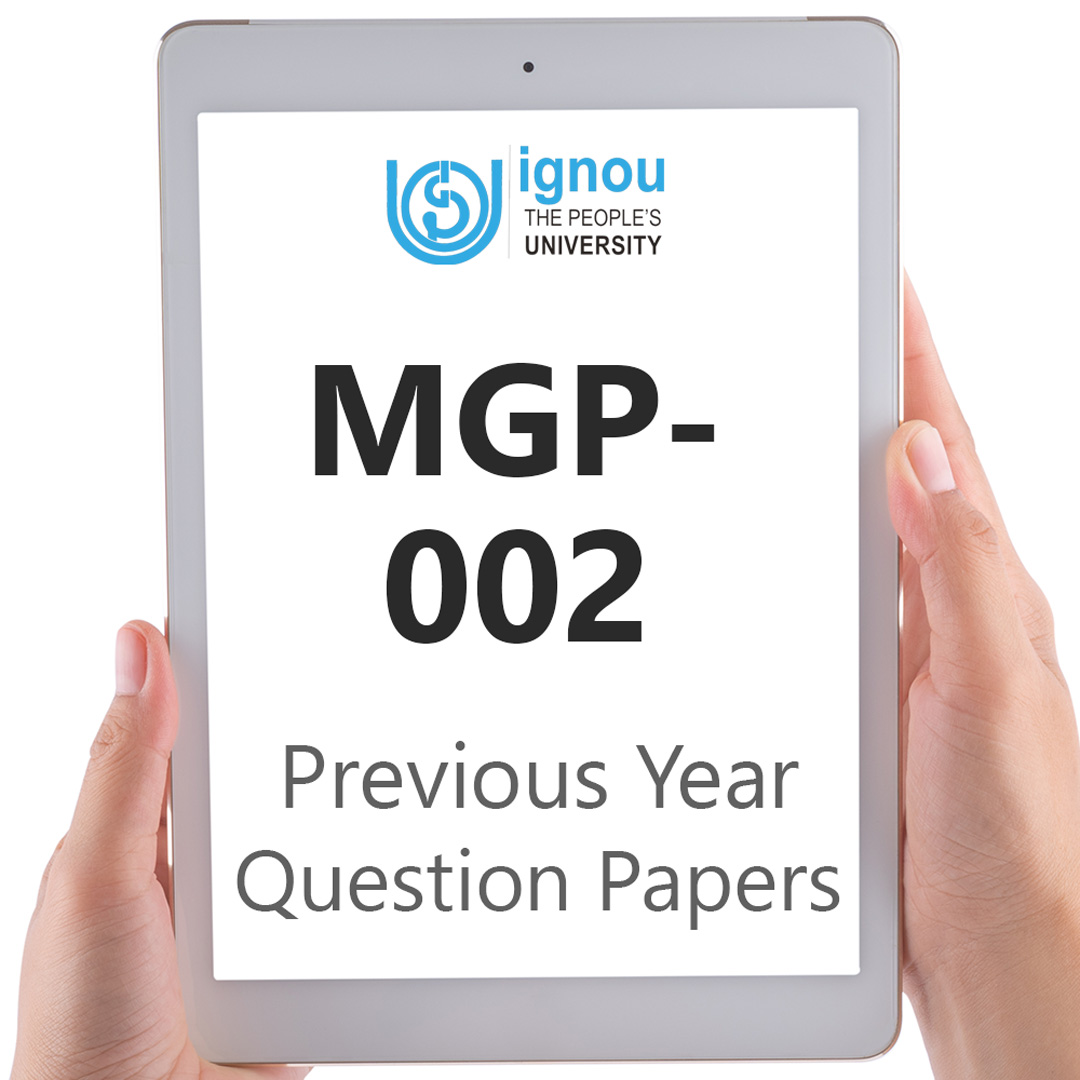If you are looking for MGP-002 IGNOU Solved Assignment solution for the subject Philosophy of Gandhi, you have come to the right place. MGP-002 solution on this page applies to 2022-23 session students studying in MGPS, PGDGPS courses of IGNOU.
MGP-002 Solved Assignment Solution by Gyaniversity
Assignment Code: MGP-002/ASST/TMA/2022-23
Course Code: MGP-002
Assignment Name: Philosophy of Gandhi
Year: 2022-2023
Verification Status: Verified by Professor
Answer five questions in all, selecting at least two questions from each section. Each question is to be answered in about 500 words. Each question carries 20 marks.
Section-A
Q1) Explain the influence of Indic religions on Gandhi’s concept of Ahimsa.
Ans) Gandhi admits that Jainism had an impact on his upbringing and profession, and that it had shaped his entire viewpoint. There is a sizable Jain population in Porbandar, where he was born, and Gujarat, where he obtained his early schooling. According to Gandhi, by the time she emerged, the sun would have set, disappointing all the kids. Fasting, which is really a discipline shared by all religions, has taken on a Jain flavour in Gujarat and influenced Gandhi. Gandhi would fast for the same reason that the Jain tenets do self-purification rather than to pressure or sway others.
Gandhi did not like the term ascetic, yet he did adhere to the asceticism prescribed by Jainism. His idea of modest living and lofty thinking is the one that the religion advises. He prescribed eleven vows for the residents of Sabarmati Ashram, several of them are Jain vows. The Sabarmati Ashram's inmates were required to observe eleven vows. To meet the needs of the Ashram, the first five vows truth, nonviolence, non-stealing, Brahmacharya, and non-possession were expanded. The first five are Jain vows, and according to him, they are all interconnected; breaking even one of them would result in a complete breach of the Ashram's code of conduct.
For Gandhi, ahimsa wasn't only a strategy or a path; it was also a belief system, a religion, and a way of life. Gandhi withdrew the entire movement when the civil disobedience movement became violent in the village of Chauri Chaura, claiming that the people were not ready for the principle of non-violence and that the movement needed to be continued once the nation was ready for that. "Non-violence is a spiritual food we must eat regularly," he writes. Satisfaction is not a real state. Gandhi offered numerous definitions of nonviolence, some of which were influenced by Jain philosophy:
A suffering-based law is non-violence.
Not a tool for the helpless.
The soul's quality of soul force.
It is impossible to practise complete nonviolence as long as physical existence exists.
Benevolence toward all life.
Being non-violent, even toward snakes, scorpions, and other venomous animals.
Gandhi's Karma idea is also very similar to Jain perspective. Karma is both the cause and the result in Jainism. According to Gandhi, karma is a means of making amends for the past as well as a necessity for the future, so that good deeds result in good things happening in the future. Gandhi is renowned for upholding the Ahimsa precept, and his nonviolent resistance captured the attention of the world and drew in many followers who, by upholding the concept, brought about significant changes in their societies.
Gandhi gave this idea additional dimensions and a new philosophy, turning it into a brand-new tool for combating evil. Also influencing Gandhi were the works of Thoreau, Tolstoy, and Ruskin. They encouraged citizens to resist cooperating with the government if it appeared oppressive or dictatorial. Gandhi's strategy gave their ideas a concrete form, first in his opposition to the very chaotic rule of colonial governments in Africa and later in the Indian Independence War.
Q2) Explain the key concepts of Judaism.
Ans) Of the three Semitic religions, Judaism is the oldest and is credited with introducing monotheism. The "Old Testament," which is its foundational text, is regarded as a comprehensive treatise outlining God's plan for humanity. The Jewish book of divine teaching known as the "Torah" is prominent among the Hebrew scriptures, which were composed approximately 450 BC. Five Books of Moses are included in this book. Genesis, Exodus, Leviticus, Numbers, and Deuteronomy are the five books mentioned. This passage of scripture also includes the twelve Minor Prophets, Joshua, Judges, Samuel, and Kings, as well as Isaiah, Jeremiah, and Ezekiel.
The Torah and the Prophets convey two stories one about the exile from Paradise, which affects all of humanity, and the other concerning the Israelites, the recipients of the Torah. Judaism can be traced back to Adam and Eve, the Garden of Eden, the destruction of Paradise, and these events. According to the holy writings, the first humans on earth rebelled against God and lost the paradise. The "Torah" presents exile as a result of rebellion, followed by repentance and the restoration of the Promised Land as a recompense for those actions. Judaism's written law was supplemented by the first oral tradition-related text, the Mishnah, as well as the Talmud’s of Israel and Babylonia, which are commentaries on the Mishnah. Talmud was added to the Torah to make it longer.
Four Key Concepts of Judaism
Both public and private life are subject to the laws of God's world system. God's creation is flawless and consistent with the established order of things. People who adhere to the Torah are followers of God, while those who reject it—the gentiles—reject God in favour of idols. God wanted to punish Israel for rebelling, and in order to do so, he employed gentiles as a vehicle for that punishment. This is how Israel is currently constituted.
The perfection of creation ensures that human affairs are timeless, that there is a social commonwealth, and that finite resources, once distributed, remain unchanging. These qualities lead to exact justice. Because man was made in God's image, perfection also secures complementarities between God and man.
Israel's current state, both publicly and privately, is a result of rebelling against God's will. Man has rebelled against God, and as a result, the world's order is disrupted by his sin. The Israeli people have likewise experienced what occurred to Adam and Eve. God discourages pride in man by punishing it. God grants forgiveness and improves man's situation when he repents. Humility breeds repentance, which results in God's favour.
The perfection that was originally intended for creation by God will be restored. The sin-related death would vanish, and the dead would be revived and held accountable for their actions. And many will reclaim the paradise that was lost after being vindicated. The Israelites will reclaim their homeland, idolaters will perish, and the remaining members of humanity will come to know God and spend all of time in His light, just as Adam and Eve reclaim paradise.
Q3) Examine the Western Thinkers’ influences on Gandhi’s philosophy.
Ans) The Western Thinkers’ influences on Gandhi’s philosophy are as follows:
Henry David Thoreau
While living in South Africa, Gandhi created the idea of "Civil Disobedience." All Indians over the age of eight were required by law to register with it and have the issued card about at all times; failure to do so may result in a fine, a jail sentence, or expulsion. He studied Thoreau's article On the Duty of Civil Disobedience while he led his "Passive Resistance" protest against the new law passed by the apartheid regime. Thoreau's belief that a just man belongs in prison under an unjust regime deeply affected Gandhi, who referred to him as his "master." He even claimed that the American philosopher had given his non-violent style of agitation scientific validation.
John Ruskin
An opponent of industrial capitalism during the Victorian era, Ruskin was an English critic. On a train from Johannesburg to Durban in June 1904, Gandhi's friend Henry Polak gave him a copy of Ruskin's Unto this Last. Gandhi claimed that "the great book" had a profound impact on him and changed the course of his life. Physical labour is valued higher than intellectual labour in Gandhian society, and the lives of farmers and artisans are seen as the ones that are worth living. Along with the idea that the good of the individual is contained in the good of all, he adopted this from Ruskin.
Leo Tolstoy
The two most notable proponents of nonviolence as a way of life and a strategy for resistance were Gandhi and Tolstoy. The Russian author's concept of "love as the law of life" and concern for all people deeply moved Gandhi, who claimed that Tolstoy's The Kingdom of God is Within You "made an indelible impression" on him. Gandhi experimented with Satyagraha techniques at his second ashram, which he called after Tolstoy and located in South Africa. He was carrying a copy of The Kingdom of God is Within You as he was led in handcuffs to court after an uprising in Transvaal. Tolstoy's idea of "Bread Labour" was included into Gandhi's "Ashram vows" and led to the creation of the Gandhian ideal that requires prisoners to work for a living.
Socrates
Gandhi first encountered Socrates' "Apology" while he was imprisoned during the Transvaal movement in 1908; it is a literary modification of the famous speech the Athenian philosopher delivered while on trial in 399 BC. Socrates emphasised his willingness to give his life for his beliefs in the military jargon. He stated that abandoning one's goal shouldn't be justified by fear of death. Gandhi referred to the thinker as "a soldier of truth" and said that the concept of self-sacrifice inspired him to develop the tenets of the Satyagraha movement. Immediately after being freed from prison, Gandhi published the "Apology" translation in Gujarati as a series of articles in Indian Opinion.
Ralph Waldo Emerson
Gandhi was a staunch supporter of rural life in addition to being an outspoken opponent of urbanisation. In his ideal Indian society, villages were self-sufficient and employed the barest amount of resources to provide for everyone's "needs," but not everyone's "wants." Gandhi took this idea from the beliefs of American philosopher Ralph Waldo Emerson, whose outlook focused on the idea of moral improvement and self-reliance. His first exposure to Emerson's writings came while he was a student in England.
Section-B
Write a short note on each part of the question in about 250 words:
Q6) (a) How important was ‘The Gita’ to Gandhi as a source of spiritual strength?
Ans) The Bhagavad Gita or the Gita was the most influential source of Gandhi’s religious thought. He was greatly influenced by its teachings in every walk of life. Gandhi was much impressed by the principle of ‘equality’ of mind under the joyous and adverse circumstances alike; to remain unaffected by ‘pleasure or pain, victory or defeat, without hankering after the fruit of action’ was a trait Gandhi tried to imbibe and implement all through his life. In later years, Gandhi himself interpreted Gita, which was meant for everyone and published it in Gujarati in March 1930. He named it as ‘Anasakti Yoga,’ a result of prayerful study and experience
The Avatar idea indicates man’s wish to become like God rather than indicates God’s descent to man. It is possible for every human being to become perfect, as God is, and it is necessary for us to aspire towards it. As for the ‘gospel’ element in the Gita it is Bhakti or devotion, the gospel of Jnana or knowledge. Life should be a harmonious whole of these three. But the key to all of these is the doctrine of Anasakti. Liberation from further bondage of action and renunciation as the best form of Ahimsa appealed to Gandhi with much fervour.
Gandhi was a persistent practitioner of the creed he believed in, and the Gita’s Karma yoga greatly influenced him. ‘Gandhi’s annotation of the Gita in the light of ahimsa has stressed the intimate relation between the truth of philosophy and the daily life and thought of the people as he tried to mould them with equal significance.’ Gandhi views the Gita as not an aphoristic work but a great religious poem; he advised all to study the deeper meaning in it as one derives richer meaning and was meant for all ages, people, and teachings. It is up to the seeker to judge the depth of it and extract from it the greatest treasure of life.
Q6) (b) Truth and God in Gandhian Thought
Ans) Gandhi believed God's existence could only be partially reasoned out. There is a changeless, living Power that creates, dissolves, and re-creates, as he said. His definition of God's spirit. God is Truth and Love to Gandhi. Gandhi reaffirmed God as an impersonal principle, law, power, or 'sum of all that lives'.
Realisation of the Self
Morality, humility, and living faith lead to self-realization and God. Wisdom is self-knowledge. This is attainable through a disciplined life of truth and non-violence, abstention from human appetites, physical needs, and comforts, and persistent attempts to know oneself, one's mission in life, and one's service to mankind. This knowledge makes us realise the importance of truth in life since it helps us realise God and ourselves. The seeker of truth should be humbler than the dust. Humility matters. Without rage, conceit, and other vices, this reveals truth. Without faith, it's hard to sustain a longing for God. Only immanent faith in God may bring spiritual heights. Gandhi felt God became present in this endeavour 'not as a person but indeed'.
Liberation
Gandhi strove to see God in all living things and serve humanity to realise Him. Gandhi wanted moksha, or liberation. Gandhi pursued moksha via nonviolence and truth. Only they can secure a compassionate life on earth and moksha in the ether world, he claimed. Even the forest dweller cannot be fully free from violence, despite his unlimited compassion; the body itself is a house of slaughter, and Moksha and Eternal Bliss consist in perfect escape from the body. All pleasure, save the ecstasy of Moksha, is evanescent, imperfect.
Q7) (a) Gandhi’s Arguments against Modern Civilisation
Ans) According to Gandhi, the core and fundamental reason India lost its freedom was due to its people drifting away from their primarily spiritual civilization and toward the material wealth of the Western civilisation. He denounces the fratricidal behaviour of Indian princes, which provided the British with an opening to expand their military presence in this region. He also points to the hostility between Hindus and Muslims in India, who were constantly drawing their swords at one another, as a possible opening for the East India Company.
Gandhi believed that Indian civilization was without a doubt the best, but that all civilizations had gone through trials and that the British era was Indian civilization's. Gandhi bemoaned that India's civilisation had been in danger because its sons had been found deficient during this time. Gandhi, however, sounded fairly optimistic when he recognised that slavery had not afflicted all of India and that it had only affected those who had been impacted by modern civilization.
Gandhi used the proverb that the removal of a disease's cause results in the removal of the sickness itself to introduce his strategy for liberating India. In a similar vein, he asserts that India can become free if the cause of its servitude is eradicated. He also mentions the intriguing issue that the entirety of India is unaffected. Only those impacted by Western civilization have been reduced to slavery. We use our own terrible foot-rule to judge the entire cosmos. Slaves tend to believe that everything in the universe is under their control. We believe that India as a whole is in such condition because of how miserable our situation is. Although it is untrue, it is nonetheless appropriate to attribute our slavery to all of India.
Q2) (b) Ecological Dimension of Sarvodaya
Ans) Sarvodaya emphasises the complete material and spiritual development of every person and is concerned with maintaining a healthy environment to ensure the growth of man as a whole. It is necessary to apply the Sarvodaya philosophy to every sentient and non-sentient thing in the cosmos since humans are organically connected to the entire ecosystem and its optimal functioning. Once more, the ideal mode of holistic discourse advocated by Gandhi, Sarvodaya, has an inherent ecological component. Perhaps Gandhi's Sarvodaya vision holds the key to solving the problems that the ecologically troubled world of today faces.
The Gandhian ideology is rooted on the ideas of environmental preservation, sustainability, and survival. His focus on small-scale industry, which encourages production by the masses in place of mass production, was in line with the co-evolution of man and nature since it uses less energy and, as a result, produces less pollution. In order to achieve rural development, he promoted sustainable development and appropriate technologies. Gandhi's simple lifestyle, which he both advocated and lived, had a significant impact on the preservation of nature. His understanding of eco-spirituality and eco-villages has a significant positive impact on living in peace with the environment.
Gandhi favoured a need-based, people-centred economy above a machine-driven, greed-driven economy. The Sarvodaya ideal of Gandhi has significant environmental ramifications. He reaffirmed the timeless relationship between humans and environment and said that everyone should only utilise a certain amount of the available resources. Consumption should be driven by meeting needs rather than promoting greed. Gandhian ideas may be helpful in this situation because environmental ethics are rapidly disappearing, and there is a great and urgent need for an emerging eco-centric ethic and consciousness. In his ashrams, he practises voluntary simplicity or ecological living, which are sources of wisdom and inspiration.





